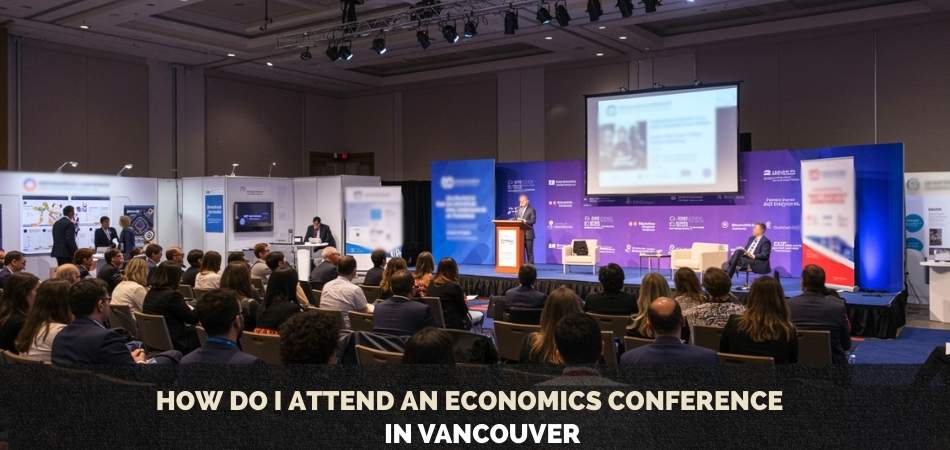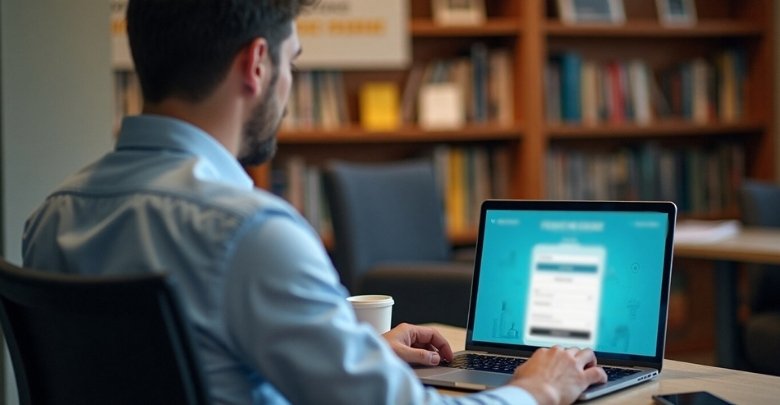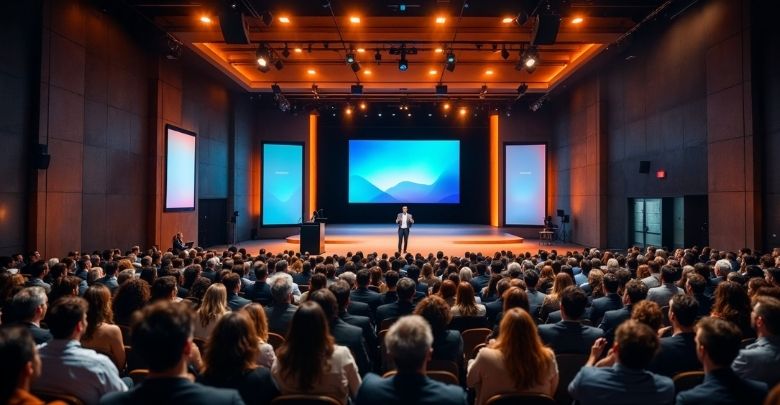Vancouver is a beautiful city in Canada where many important economic conferences are held. These events bring together smart people who talk about money, business, and how the world works. Students, teachers, and workers come to learn new ideas and meet others. The city is also a fun place to explore while you learn.
So, how do I attend an economics conference in Vancouver?
First, sign up for the event online and pick the ticket that fits you best. If you’re coming from another country, check if you need a visa or an eTA. Book a place to stay close to the event. Look over the event schedule and bring your confirmation with you.
Keep reading for a simple step-by-step guide!
How Do I Attend an Economics Conference in Vancouver?
An economics conference in Vancouver can be a fun and exciting experience. You get to learn new things, meet smart people, and see a beautiful city. If you’re a student who wants to join, don’t worry—it’s easier than you think. Just follow these seven simple steps to get started.
Step 1: Find the Right Conference
Start by looking online for economics conferences that match your interest. Some are for students, while others are for professionals or teachers. Read the details to make sure you are allowed to join. Check the conference website for the date, location, and topics.
Step 2: Register Online
After choosing a conference, go to its website and register. You may need to fill out a form with your name, email, and other details. Pick the ticket type that fits you best—some have student discounts. When you finish, you’ll get a confirmation by email.
Step 3: Prepare Travel Documents
If you live outside Canada, check if you need a visa or an eTA to enter. These are special permissions that let you travel to the country. Visit the Canadian government’s website to apply for them. Make sure you do this early so everything is ready on time.
Step 4: Book Your Stay
Look for a place to stay near the event venue. Staying close helps you reach the conference easily and saves time. You can pick a hotel, hostel, or even a student-friendly rental. Try to book early, as places fill up fast during big events.
Step 5: Learn About the Schedule
Most conferences share their daily plan on the website. Read it to see when talks and sessions happen. You’ll also find info about speakers and break times. This helps you plan your day and not miss important parts of the event.
Step 6: Get Ready for the Event
Now that everything is set, pack what you need. Bring your ID, your event confirmation, and a notebook or tablet for notes. Dress neatly and be on time. It’s also a good idea to bring snacks and water in case you get hungry during the day.
Step 7: Make the Most of Your Time
During the conference, talk to other students and speakers. You’ll learn more and may even make new friends. Most professional conferences in Vancouver have networking sessions, so don’t be shy to join. Ask questions, take notes, and enjoy the experience.
What Should You Take to an Economics Conference in Vancouver?
Going to an economics conference in Vancouver is a fun way to learn new things and meet smart people. But to enjoy it fully, you need to pack the right stuff. This helps you stay ready, focused, and relaxed during the day. Here’s a simple list of what you should bring:
- Event Pass and ID: Bring your ticket and a photo ID so you can enter the event without any trouble or long wait at the gate.
- Notebook or Tablet: Use a notebook or tablet to write down useful points from speakers so you can remember them later at home.
- Pens and Markers: Carry some pens and colorful markers to take notes in a clear way and highlight the parts you find important.
- Water Bottle: A water bottle helps you stay fresh, especially when you are walking a lot or if it’s warm inside the venue.
- Small Snacks: Bring snacks like fruit, nuts, or granola bars in case you get hungry between talks or skip a meal by mistake.
- Phone Charger or Power Bank: Your phone might lose battery quickly, so take a charger or power bank to keep it working the whole day.
- Contact Card or Info Sheet: It’s good to share your name and email with others, so they can contact you after the event is over.
- Comfy Clothes and Shoes: Wear clean and neat clothes, but make sure your shoes are comfortable because you might walk or stand a lot.
- Folder or Small Bag: Use a folder or light bag to keep papers, notes, or handouts neat and safe during the day.
- Map or App with Info: Have a map or use a phone app to find your sessions, food spots, or places to sit and rest.
How to Register and Secure Your Participation for the Economics Conference in Vancouver?
Joining an economics conference in Vancouver can be a great way to learn and grow. But before you go, you need to register and confirm your spot. This simple guide will help you do everything right from the start.
Step 1: Visit the Official Website
Search for the official website of the conference you want to attend. Make sure the page is real and updated with correct details. Take time to read about the event, speakers, and schedule. This helps you know what to expect before signing up.
Step 2: Create Your Account
Some events ask you to make an account before you register. Fill in your name, email, and other needed details. Pick a password that’s easy to remember but hard to guess. Keep your login info safe in case you need to check later.
Step 3: Choose the Right Ticket
Most conferences have different ticket options for students, teachers, or professionals. Read the ticket types and select the one that fits you best. Some might include extra sessions or meals. If you see a student discount, make sure to use it.
Step 4: Fill Out the Registration Form
After picking your ticket, complete the form with all the needed information. Double-check your name, email, and any other details before you submit. Some forms may also ask for your school or interest in economics. Always check for spelling mistakes before moving forward.
Step 5: Make the Payment
The website will take you to a secure page to pay for your ticket. Use a card or payment method that works in your country. After payment, you’ll get a receipt or an email that confirms everything. Keep this email safe—you’ll need it to enter the event.
Step 6: Watch for Confirmation
A few minutes after you register, check your email for a confirmation message. This message will have your ticket, receipt, or event details. If you don’t see it, check your spam or junk folder. You can also log in to your account and download it again.
What are the Costs Involved in Conference Attendance?
Attending a conference is a great learning opportunity, but it also comes with several costs. These expenses can be different for everyone depending on where the event is, how long it lasts, and how big the conference is. Below is a clear breakdown of the main costs you should plan for before joining an event like an economics conference in Vancouver.
Registration Fees
This is the main cost of attending the conference. It gives you access to sessions, workshops, materials, and sometimes meals or networking events.
- Small/local conferences: $200–$500
- Mid-sized conferences: $500–$1,000
- Large or popular events: $1,000–$1,500+
- Early bird prices or group discounts can help lower these fees.
Travel Expenses
You need to pay to get to the conference city. This includes plane tickets, train fares, car fuel, or bus costs. Local transport like taxis, rideshares, or subways will also add to the cost. Your total travel price depends on how far you’re going and the travel type.
Accommodation
You’ll likely stay in a hotel or a rented place near the event. Prices change based on the city, hotel type, and how early you book. Sharing a room with a friend or using Airbnb can help save money. Always try to book your stay as early as possible.
Meals and Daily Expenses
Some events provide meals, but many do not cover all your food. You’ll need to pay for snacks, drinks, or meals outside the event. Don’t forget coffee breaks and any extras like water or dessert. Set a daily food budget to stay on track.
Miscellaneous Costs
This includes things like printing your schedule or buying small gifts, or conference items. Some events have optional networking parties or paid workshops. If you’re coming from another country, you may need a visa, insurance, or tipping money. These extra costs can surprise you if you don’t plan.
Other Things to Consider
Sometimes, your school or a sponsor might help pay part of the costs. It’s smart to keep a little extra money (10–15%) for surprise expenses. This could cover anything from a taxi ride to a missed meal or an emergency need. Planning ahead helps avoid stress during the trip.
Total Cost Range (Per Person)
On average, attending a conference can cost between $500 and $2,500, depending on your choices for travel, stay, and meals. Larger, multi-day events in busy cities can go over $3,000. That’s why budgeting for attending an economics conference in Vancouver is important to avoid surprises. Planning early helps you stay stress-free.
Benefits of Being Well-Prepared for a Conference You Will Attend
Getting ready for a conference can feel like a big task, but it really makes a big difference. When you prepare well, everything becomes easier and less confusing. You can focus more on learning and having fun instead of worrying. Let’s look at why being prepared is such a smart idea.
Smooth Start
When you’re ready, your day begins with less stress and fewer problems. You don’t have to rush or panic about forgetting something. You know where to go and what to expect. That means you can enjoy your time instead of worrying. A calm start always helps you stay focused.
Better Learning
If you know what topics will be covered, you can follow along more easily. You’re not lost or confused during the sessions. It’s also easier to take notes and understand what speakers are saying. You’ll remember more after the event because things made sense. That’s why reading the schedule helps a lot.
More Confidence
When you’re prepared, you feel sure of yourself. You can talk to new people without feeling shy or nervous. It’s easier to ask questions or join a group discussion. You won’t feel left out because you know what’s going on. Confidence makes the experience a lot more fun.
Saves Time
You don’t waste time trying to figure things out during the event. You already know where to go and what to do. That means more time to learn, explore, and talk to others. You also won’t miss out on cool sessions or activities. Time saved is time well used.
Better Planning
Having everything packed and ready helps you stay on track. You don’t forget snacks, chargers, or your event pass. It’s easy to focus when you don’t have to worry about small things. You also avoid last-minute shopping or borrowing. That means you stay relaxed all day.
Meet More People
Being prepared helps you start conversations with others. You can talk about the event, speakers, or sessions with ease. People like chatting with someone who knows what’s happening. You might even make a few new friends. And who knows, they might help you too.
More Fun
Everything is better when you don’t have to worry about small problems. You can enjoy the talks, games, or group chats. You get to focus on the fun parts instead of feeling stressed. Being ready means you have more energy to enjoy the day. And that’s what makes it special.
Do I Need Any Special Qualifications to Attend?
No, you don’t need any special qualifications to attend an economics conference in Vancouver. Most conferences welcome students, beginners, and anyone interested in learning more about economics. You just need to register and show interest in the topic. Some events may have suggestions, but they are usually open to all.
Type of Conference
Some conferences are open to the public while others are only for professionals or researchers. Always check the event page to be sure. Public events usually welcome students, teachers, and curious learners. If unsure, email the organizer before registering.
Age and School Level
Many conferences allow school students, especially older ones from high school or college. You don’t need to be in college to attend. If you’re underage, you may need a guardian’s permission. Always read the rules shared on the event website.
Interest in Economics
You don’t need deep knowledge, but being interested helps a lot. Sessions can be more fun when you understand the topic. It also helps when asking questions or talking to others. Interest is more useful than any special skill.
Registration Type
Different ticket types are made for different people, like students, teachers, or professionals. Pick the one that matches your level. Student tickets are often cheaper and easier to get. Just be sure to bring ID if asked.
Event Topics and Level
Some events are very detailed, while others are simple and easy to follow. Always check the topic list before you join. Look for sessions made for new learners. This helps make the conference more enjoyable and easier to follow.
Participant Categories
There are different categories made for suitable participants for economics conferences in Vancouver based on age, knowledge, and role. For example, student, guest, speaker, or volunteer. Picking the right one helps you enjoy the event more. It also lets organizers know how to assist you.
FAQs About Attending Economics Conferences in Vancouver
If you’re thinking about joining an economics conference in Vancouver, you probably have a few more questions in mind. From age limits to what you can expect, we’ve got you covered. Here are some helpful FAQs with simple answers just for you.
Is There an Age Limit to Attend?
Most conferences do not have a strict age limit, but younger students may need an adult to join them. Always check the event rules first. High school students are usually welcome. Some events may ask for a signed permission form.
Can I Volunteer at the Conference?
Yes, many conferences offer volunteer spots to students who want to help out and learn at the same time. Volunteering can lower costs. You may help with check-ins or guiding guests. Check the website early to apply as a volunteer.
Will There Be Breaks During Sessions?
Yes, most conferences include short breaks between sessions so you can rest, eat, or walk around the venue. Breaks are usually planned clearly. These breaks help you stay fresh. Use them to chat with others or review your notes.
Are Group Registrations Allowed?
Yes, some conferences allow group registrations for schools or clubs, and they often offer a discount. You can attend with friends. It’s more fun in a group. Check the registration page for group options and prices.
Can I Bring a Friend Who Isn’t Into Economics?
Yes, your friend can come if they register and follow the rules, even if they don’t study economics. Conferences are open to learners. They might find a topic they enjoy. It’s a good way to try something new.
Is Wi-Fi Available at the Venue?
Most venues provide free Wi-Fi for all attendees, but signal strength may vary based on the location. You can ask for the password. Wi-Fi helps for checking the schedule or taking notes. Bring your charger or power bank too.
Will There Be Activities for Students?
Yes, many conferences include special student-friendly sessions, Q&As, or fun workshops to make learning more interactive. Some may even host games. These are great for understanding economics better. Keep an eye on the event schedule for such parts.
Do I Have to Stay All Day?
No, you don’t have to stay the whole day, but attending more sessions helps you learn and enjoy more. You can leave anytime. Try to attend key talks or fun sessions. Plan your day so you don’t miss the best parts.
Final Considerations
Going to an economics conference in Vancouver is a fun way to learn new things and meet new people. It also gives you a chance to see a beautiful city while enjoying the event.
If you’re asking yourself how do I attend an economics conference in Vancouver, the answer is simple—just pick the right event, sign up, and get ready. You don’t need to be an expert, just be interested and willing to learn.
Make sure to plan your trip, pack what you need, and stay on budget. Once you’re there, enjoy the sessions, talk to others, and have a great time!








